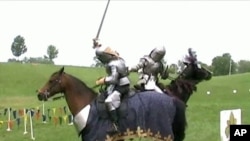In days of old, knights fought for damsels in distress, but in the 21st century, they sometimes battle to help small communities raise revenue.
Jousting, in which armored knights compete in games of skill on horseback, was as popular during the Middle Ages as football is today. While the sport was enjoyed for nearly 400 years, the widespread use of firearms made the older weapons obsolete in war.
Today, jousting is making a comeback in some U.S. communities as sport, entertainment and to generate revenue.
June Julian, executive director of the Steuben County Tourism Bureau in the Fort Wayne, Indiana area, was surprised when jousting was suggested as a new source of money for her community.
“I didn’t know what to expect," she says. "I thought 'We’ll need to have insurance. What if someone gets hurt?'”
But Julian’s fears were quickly put to rest when she met Scott Rodlin, a professional jouster who performs under the name Sir Devon of York.
“I trained at the Academy of European Medieval Martial Arts in Canada,” says Rodlin.
Jousting tournaments are held around the United States as well as in many other countries. They are typically overseen by associations that regulate and ensure safety at the games.
The modern sport dates back just a few decades to the popular Renaissance fairs. Part theme park, part theater, these summer festivals recreate the sport of the Middle Ages. There are eight theatrical jousting troupes and 30 competitive jousters in the United States.
While women did not joust in the Middle Ages, things have changed today. Rodlin’s friend Becca Cooper got into the sport when he bought a horse from her.
“We joke that I came with the horse," Cooper says. "I said 'I don't know what jousting is, but I think I can do it.'”
And she does. For Cooper, who jousts as the character Dame Fiona of Orchany, it is an empowering sport.
“I particularly like the little girls that say, 'Look mommy, there's a female knight. I don't want to be a princess anymore, I want to be a knight.'”
Just as in days of old, each knight wears a custom-made suit of armor weighing about 41 kilograms. They wear soft, padded coats underneath to keep the heavy metal from pinching.
A recent contest in Angola, Indiana, consisted of a series of events to display skill of arms and horsemanship, such as spearing rings onto a lance or splitting a cabbage in half with a sword while riding at full speed.
Spectator Carol Morris says it's excitement the whole family can enjoy.
“Very, very good," she says. "A good way to get your blood pumping and all your frustration out.”
And, not a bad way to increase tourism. More than 2,000 people attended the event, giving the small city a big boost.
Tourism director Julian says it was so successful, they are already planning next year’s event.
“We had quite a few hotel rooms filled because there were people from out of town,” she says.
Jouster Rodlin says he enjoys a career that allows him to be a hero - whether it’s using his skill to help small communities bring in needed revenue or showing small spectators how to dream big.
“Kids can see that you don't necessarily have to have the traditional career," he says. "You can do whatever you want to do.”
Even if it's growing up to work a fairy tale job.




